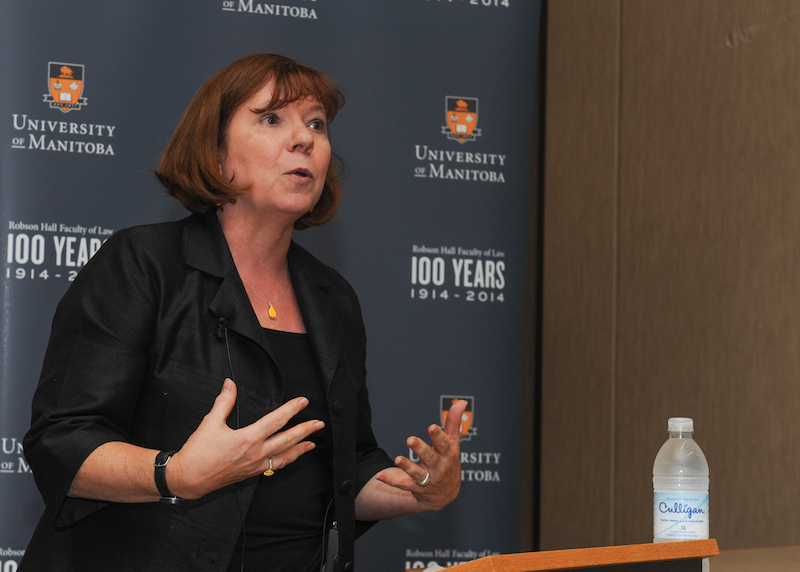
Kimberly Prost speaking at the U of M / Photo: Mike Latschislaw
Alumna protects the rights of terror suspects
Sitting on a genocide trial for four years persuaded Judge Kimberly Prost the world needs every possible tool to prevent atrocities — including sanctions introduced in the late 1990s that target people suspected of funding terrorism.
“You could wake up one morning, you go down to the bank, you try to withdraw some money and the bank tells you, ‘I’m sorry, all of your assets are frozen.’ They can’t tell you why, you had no notice.”
Not to mention that you are suddenly banned from travelling or possessing a weapon.
But what if it’s all a terrible mistake and you’re not a terrorist?
Email Prost and she’ll investigate. Previously a judge on the International Criminal Tribunal for the former Yugoslavia and long before that a U of M Faculty of Law student, Prost is the first independent ombudsperson to the UN Security Council’s Al-Qaida sanctions committee.
So far, the committee has accepted all her recommendations about removing people from the sanctions list, but some states are more supportive than others of her thinly-staffed office. “Two weeks ago, at a meeting of the committee, I was called narrow-minded, destructive and I was said to let international terrorists roam the world,” she said. “I was told I’m obsessed with fair process.”
Prost argues that she’s in fact making the world safer because sanctions that don’t comply with international human rights standards will be challenged in court and ultimately not implemented.
When states try to justify keeping someone on the sanctions list, Prost won’t accept information obtained through torture because she doesn’t consider it credible evidence.
Now living in New York, Prost said being a Canadian helps her work, since Canada is seen internationally as neutral and non-threatening. However, other countries are sometimes more willing to share classified information with her than her own government.
She visited Robson Hall Sept. 22 to inspire students who might be considering careers in international human rights.
Prost is a fan of the International Criminal Court that prosecutes the perpetrators of the world’s most serious crimes. One member of the audience asked whether it wouldn’t be more effective to offer murderous political leaders amnesty as an inducement to step down.
“There are a lot of really disturbing amnesties that have been issued over the years covering really horrific crime,” she said. “There is no lasting peace without some form of justice.”
Prost acknowledged these are difficult times for international criminal justice, with a sharply divided Security Council and an unprecedented number of global situations threatening horrific violence. She’s counting on graduates of her old law school to be among those who will help design innovations to prevent future atrocities.
“There’s much, much more we need to do to build a stronger international system to address terrorism, to address international humanitarian law violations.”
Law Dean Lorna Turnbull said Prost is living proof that from the University of Manitoba, people can go anywhere. The international human rights lawyer started out working for Justice Canada in Winnipeg before moving to Ottawa and then Europe.
UM Today spoke with Judge Prost. Read more here.






